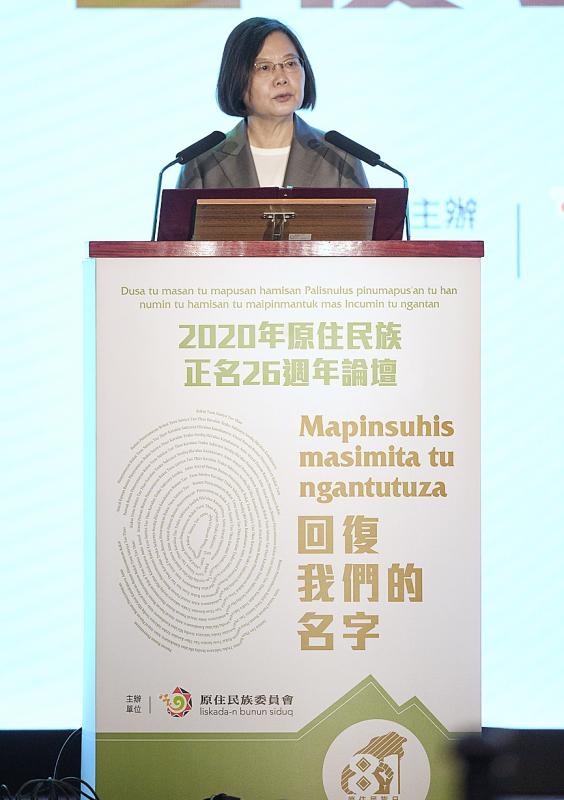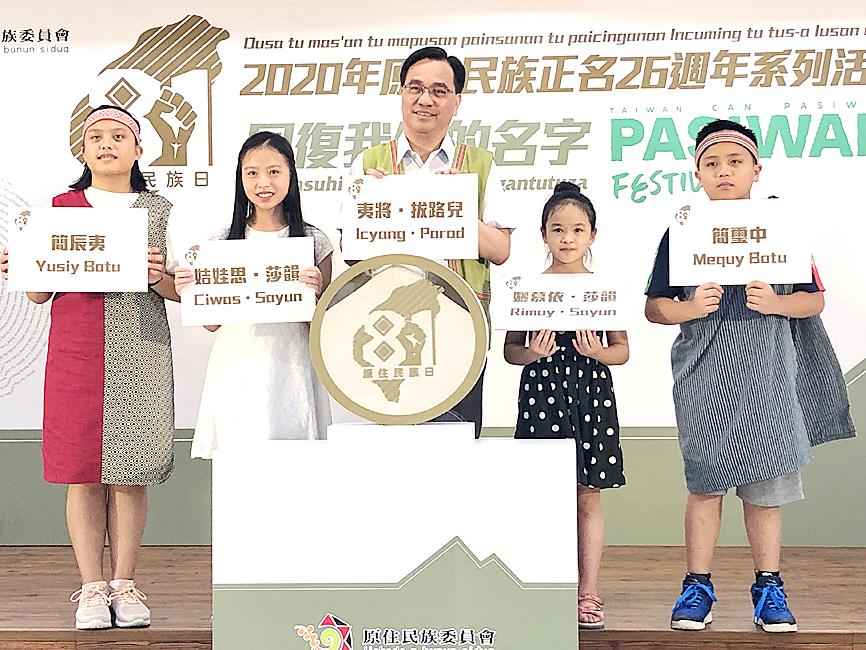Aborigines should recover their own perspectives of history as they reclaim their traditional names and cultures, President Tsai Ing-wen (蔡英文) said yesterday, which was Indigenous Peoples’ Day.
Tsai made the remarks at a forum in Taipei marking the 26th anniversary of a constitutional amendment acknowledging Aborigines, which was attended by government officials, Aboriginal rights advocates and foreign representatives.
An amendment to the Constitution in 1994 legally recognized Aborigines by dropping the term “mountain compatriots,” a result fought by rights advocates for more than a decade prior and approved by then-president Lee Teng-hui (李登輝), Tsai said.

Photo: Chang Chia-ming, Taipei Times
‘ETHNIC MAINSTREAMING’
As Aborigines have recovered their names, languages and cultures, it is also essential that they recover their own perspectives of history and that other ethnic groups learn to understand their viewpoints, she said.
Her administration has been promoting the ideal of “ethnic mainstreaming,” so every ethnic group in Taiwan can construct history together, she said.

Photo: Luo Chi, Taipei Times
Some attendees shared troubles they had encountered for using traditional names.
Sameguwan Paljaveljav, a 16-year-old Payuan based in Pingtung County, said that he now studies at home, but when he attended school, many classmates mocked his name by deliberately mispronouncing it or giving him nicknames.
When written in Chinese, his name requires nine characters, while most people have three or four, he said.
Although he once hated his name, he came to feel that it brings him closer to his community elders, he added.
Sameguwan Paljaveljav said that he still gets asked by people how to pronounce his name — some treat him as a Japanese or English speaker — but people are learning it.
He said that he is glad that he has embraced the name that his parents game him.
Presidential Office spokeswoman Kolas Yotaka said that some reporters had complained about her insistence on using the romanized spelling of her name when she became Executive Yuan spokeswoman in 2018.
NOT TROUBLEMAKERS
Recovering their traditional names means they are retrieving subjectivity, which does not mean they are troublemakers, Kolas said.
Aborigines can register their names with Chinese characters or romanized along with the Chinese characters, Council of Indigenous Peoples Deputy Minister Iwan Nawi said.
Since Aborigines were allowed to resume official use of their traditional names when the Name Act (姓名條例) was amended in 1995, only 31,917 people — or 5.5 percent of the nation’s Aboriginal population — have done so, she said.
The government’s ultimate goal is that all Aborigines can use the romanized spelling of their name without Chinese characters, Deputy Minister of the Interior Chen Tsung-yen (陳宗彥) said.
However, more social support is needed to push for updates to government and airline registration systems before the change could happen, he said.

A relatively large earthquake may strike within the next two weeks, following a magnitude 5.2 temblor that shook Taitung County this morning, the Central Weather Administration (CWA) said. An earthquake struck at 8:18am today 10.2km west of Taitung County Hall in Taitung City at a relatively shallow depth of 6.5km, CWA data showed. The largest intensity of 4 was felt in Taitung and Pingtung counties, which received an alert notice, while areas north of Taichung did not feel any shaking, the CWA said. The earthquake was the result of the collision between the Philippine Plate and the Eurasian Plate, the agency said, adding

Snow fell in the mountainous areas of northern, central and eastern Taiwan in the early hours of yesterday, as cold air currents moved south. In the northern municipality of Taoyuan, snow started falling at about 6am in Fusing District (復興), district head Su Tso-hsi (蘇佐璽) said. By 10am, Lalashan National Forest Recreation Area, as well as Hualing (華陵), Sanguang (三光) and Gaoyi (高義) boroughs had seen snowfall, Su said. In central Taiwan, Shei-Pa National Park in Miaoli County and Hehuanshan National Forest Recreation Area in Nantou County saw snowfall of 5cm and 6cm respectively, by 10am, staff at the parks said. It began snowing

HOLIDAY EXERCISE: National forest recreation areas from north to south offer travelers a wide choice of sights to connect with nature and enjoy its benefits Hiking is a good way to improve one’s health, the Forestry and Nature Conservation Agency said, as it released a list of national forest recreation areas that travelers can visit during the Lunar New Year holiday. Taking a green shower of phytoncides in the woods could boost one’s immunity system and metabolism, agency Director-General Lin Hwa-ching (林華慶) cited a Japanese study as saying. For people visiting northern Taiwan, Lin recommended the Dongyanshan National Forest Recreation Area in Taoyuan’s Fusing District (復興). Once an important plantation in the north, Dongyanshan (東眼山) has a number of historic monuments, he said. The area is broadly covered by

COMMUNITY SPIRIT: As authorities were busy with post-typhoon cleanups elsewhere, residents cleaned fallen leaves and cut small fallen trees blocking the hiking trails All hiking trails damaged by Typhoon Kong-rey have been repaired and has reopened for people who want a refreshing hike in Taipei during the Lunar New Year holiday, a city official said. The Taipei Basin is known for its easily accessible hiking trails. It has more than 130 trails combined into the 92km-long Taipei Grand Trail, which was divided into seven major routes when it was launched by the Taipei City Government in 2018. Last year, a part of the sixth route of the Grand Trail collapsed due to Typhoon Kong-rey, which hit Taiwan in October. The damaged section belongs to one